
Demeter vs. Bioland Farming: What’s the Difference?
🍼 OBF24™ BLOG
In the US, there’s organic and whatever we want to call the non-organic version. It’s a bit disingenuous to call it “traditional” since the current factory-farming methods only date back to the 1970s. “Traditional” makes it sound more normal. Still, in reality, factory farming is an aberration from thousands of years of organic farming when nearly everything that animals ate, particularly cows, came from the land around them.
What is Demeter?
Operational in more than 50 nations, Demeter Biodynamic Certification holds the position of being the predominant certification body in the realm of biodynamic farming. With its origins tracing back to 1928 in Germany, it draws its name from Demeter, the ancient Greek goddess associated with fertility and grain. The key prerequisite for obtaining Demeter certification involves farms adhering to stringent protocols, necessitating an annual renewal of their certification. Rigorous yearly inspections encompass the entire span of the farm.
So, what precisely are the benchmarks that a farm must fulfill to attain Demeter certification? At its core, Demeter's philosophy revolves around conceiving the farm as a comprehensive, self-sustaining entity. A distinctive facet of this philosophy entails that all strategies employed for disease prevention, pest control, and weed management should originate solely from within the farm itself. In practical application, this translates to:
Embracing preventive weed control measures like crop rotation and strategic planting, thereby eschewing harmful techniques.
Imposing stringent animal welfare standards, encompassing spacious living conditions, protection against environmental factors like heat and dust, along with guaranteeing ample sustenance and rest space for each animal. Prohibited practices include tail docking.
Rejecting the removal of cow horns, a practice with purported benefits for digestion and even milk composition. Enriching the cattle's diet with herbal elements further adds to the quality of milk, according to some accounts.
Absolute prohibition of synthetic fertilizers, aligning with the biodynamic philosophy's holistic approach.
In essence, Demeter Biodynamic Certification embraces a holistic vision of farming, coupling sustainable practices with reverence for the natural order. This ethos not only upholds ecological harmony but also elevates the quality of agricultural produce.
What is Bioland?
Established in 1971, Bioland stands as a premier organic food association in Germany. Comparable to Demeter, gaining certification from Bioland poses a challenge due to its rigorous standards. A few of its guiding principles comprise:
Upholding animal welfare – ensuring ample space through fewer animals
Imposing limitations on nitrogen fertilizers, allowing only minor usage
Permissible employment of copper pesticides solely for perennial vegetables, in limited quantities
Mandating 100% organic food production across the entire farm
Prohibiting the use of genetically modified seeds
Restricting the application of blood, meat, bone, manure, or guano fertilizers
Conclusion: What does all this mean for Baby Formula?
How does this awareness assist you in determining the suitable organic formula for your infant? Grasping the significance of these certifications provides you with insights into the comprehensive journey that underlies the creation of your baby’s nourishment. If you're facing uncertainty in reaching a decision, delving into the intricacies of formula production might offer the clarity needed for your choice.
Holle and Lebenswert emerge as commendable selections for parents seeking organic formula for their infants. Lebenswert is meticulously crafted by farms holding the esteemed Bioland certification, while Holle originates from farms endorsed with the reputable Demeter label. For conscientious parents inclined towards sustainability, either alternative stands as an excellent prospect.
We trust that this insight serves to enlighten your perspective. The next time you scan the labels on organic formula products, you'll possess a profound understanding of the journey these items undertake from the farm to the store shelves. Should you desire a more comprehensive understanding of Organic Baby Formula, our comprehensive guide is readily available to offer assistance. Alternatively, if you're in need of guidance regarding bottle selection, we've curated a guide to address that aspect as well!

